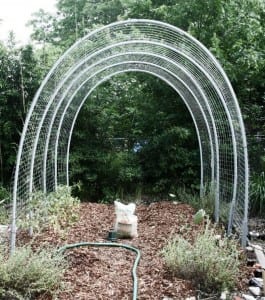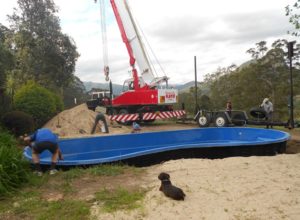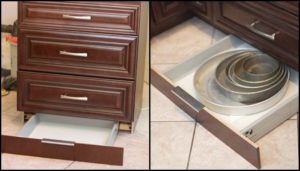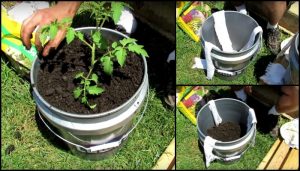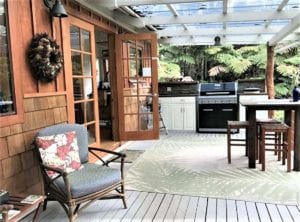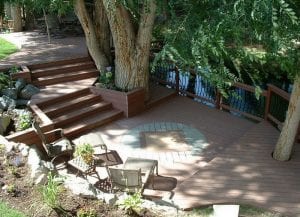Last Updated on October 20, 2022 by teamobn
I cut a 3/8″ groove along the inside of the middle crossbars, which would accept the 1/4″ tongues cut on the slats, to create the middle shelf. I also cut a 3/8″ groove along the top of the spans to accept the side slats – the wider grooves allow for wood movement.

I glued and screwed the uprights and crossbars together, then added the spans on one side using glue and pocket holes, and inserted the slats. On the prep unit, the shelf slats were about 1″ apart; on the hot unit, I spaced them more closely to make it easier to support the turkey fryer.

I added the other upright and crossbar frames of the DIY backyard kitchen to create a complete carcass for each unit. Lastly, I cut two supports out of 1/2″x3″x43″ pine stock for each shelf, attaching them to the underside of the shelf with pocket screws.
With the shelf complete I added side slats and a top spanner to two sides of the prep unit and the interior side of the hot unit (the outside of the hot unit was left open to accommodate airflow, a larger grill, or a small barrel smoker attachment).

Using 8 1″x3″x25″ hardwood pallet stock, I cut 3″ normal half-laps on one end and mitred half-laps on the other. I joined the pieces at the regular half-laps (gluing and clamping) to create the top and bottom pieces 47″ long.


I also took 4 more pieces of 1″x3″x29″ hardwood pallet stock and cut complimentary mitred half-laps on both ends to create side pieces for the tabletop of the DIY backyard kitchen (basically a frame for the slats, similar to the middle shelves on the carcasses).
Along the long pieces, I cut a 3/8″ groove 1/4″ from the top inside edge. Again, like the middle shelves, I cut a 1/4″x1/2″ tongues along about two dozen 1/2″x3″x23″ hardwood pallet stock.
I joined the mitred edges with glue and brads, fit the tongues of the slats into the grooves, and used a ~3/4″ spacer to set the spacing before securing them with more glue and brads.


I also cut two supports out of 1/2″x3″x41″ pallet stock for each tabletop, attaching them to the underside of the table with pocket screws and then to the table top slats with brads.

Recovering from Screwups:

Originally, I had intended for the table legs to be set inside of the table top with no hardware, only with a mortise and tenon joint in the corners of each table. I tried to cut the mortises by hand after assembling the table tops, but a combination of weak wood, sub-optimal chisels, and my own inexperience led to terrible joints.

I like symmetry, so I was really concerned about the table tops not being uniform. This really upset me; I had spent a ton of time working on the table tops of the DIY backyard kitchen, tried to do everything as precisely as possible, and had “ruined” one of my tables.

After a brief period of frustration and self-criticism, I lightened up. This DIY backyard kitchen project uses reclaimed wood, after all – perfect symmetry is impossible, and the only one who would really notice or care would be me.
I took this as an opportunity to practice patching and chose to use contrasting wood colours to highlight the patch, rather than trying to mask it. I glued and clamped the splintered pieces of the mortise, then made myself some blocks sized to fit the holes.
After sanding the blocks to a tight fit, I coated the blocks and holes with glue, then used a scrap piece of wood and a hammer to drive the blocks in.

The result looked surprisingly good – after filling in gaps with wood filler (I like a 1:1 mixture of sawdust and wood glue) and sanding them, the patches turned into a decorative accent to the tabletop. The few people who’ve even noticed the patches thought they were intentional and really liked the look of the contrasting wood.
Continued Page 4…

